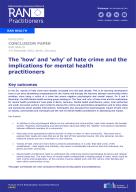Details
- Publication date
- 7 February 2023
- Author
- Directorate-General for Migration and Home Affairs
- Country
- Germany
- RAN Publications Topic
- Mental health issues
Description
In the EU, reports of hate crime have steadily increased over the past decade. This is an alarming development since it can have devastating consequences for the victims and disrupts the harmony between communities within societies, since being a victim of a crime has severe negative psychological and mental impact.
On 5 and 6 December, the RAN Mental Health working group meeting on ‘The ‘how’ and ‘why’ of hate crime and the implications for mental health practitioners’ took place in Berlin, Germany. Mental health practitioners, police, local authorities and youth and social workers were invited to discuss the victims and perpetrators perspectives and to share ideas and experiences about possible interventions. Participants also discussed the (psychological) impact of hate crime on society, communities and individuals and the role of (mental health) practitioners in addressing this impact.
Key lessons
- In addition to the psychological effects on the individual and communities, hate crime impacts the broader society. Prejudice, stereotyping and discrimination adversely affect the "healthy" and positive coexistence between different members of a community.
- Most hate crime perpetrators believe that life is unfair to them or their community. They tend not to express their needs and woes that are at the root of their personal trauma. Not only personal, but also collective trauma can be a motivation to use violence.
- Victims of hate crime are more likely to become perpetrators. It is clear that hate crime, if left unaddressed – both legally and mentally, may leave a considerable trauma for both the individual, the family and their community.
- Mental health practitioners need to understand the underlying (socio) psychological dynamics and rational behind these acts. The main focus of mental health professionals is helping people in need, which could be both victims and perpetrators. In this context, trauma-related work with the victims, their families and even within communities is key.
This paper summarises the main conclusions following the discussions and presentations.

